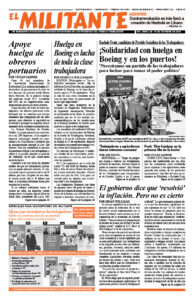For the first time in 20 years, five prisoners were executed in the U.S. in a single week, Sept. 20-26. Seven more are scheduled to be killed before the end of the year, further testimony to the brutality of the capitalist rulers’ “justice” system.
Kahlil Divine Black Sun Allah, formerly Freddie Owens, was executed by lethal injection at the Broad River Correctional Institute in Columbia, South Carolina, Sept. 20, after the U.S. Supreme Court refused a stay.
Allah was sentenced to death in 1999 after being convicted of robbing and killing a convenience-store cashier, Irene Graves, in Greenville in 1997. There was no physical evidence and Allah has always said he was innocent. His co-defendant, Steven Golden, blamed Allah for Graves’ death.
But just weeks before Allah’s execution, Golden, the only witness, told the South Carolina Supreme Court that he had testified falsely under a secret deal with prosecutors who promised him he wouldn’t face the death penalty if he fingered Allah.
‘Executed for something he didn’t do’
“Freddie Owens is not the person who shot Irene Graves at the Speedway on Nov. 1, 1997,” Golden wrote in a sworn statement Sept. 18. “Freddie was not present when I robbed the Speedway that day.”
“I thought the real shooter or his associates might kill me if I named him to the police,” Golden said. “I don’t want Freddie to be executed for something he didn’t do.”
Despite Golden’s recantation, South Carolina Gov. Henry McMaster said there was “no compelling reason” to delay the execution.
Protesters organized by South Carolinians for Alternatives to the Death Penalty demonstrated Sept. 19 at the Washington Street United Methodist Church and the Governor’s Mansion in Columbia, and outside the prison the day of the execution. They delivered a petition with more than 10,000 signatures asking McMaster to grant Allah clemency.
This was the first time state authorities had used a single dose of pentobarbital instead of the three-drug cocktail they had commonly used. “It appeared to take Owens longer to stop breathing. … about six minutes, compared to two to three minutes at previous executions,” said The Associated Press.
Four days later, Marcellus “Khaliifah” Williams, a 55-year-old African American, was executed by lethal injection at the correctional center in Bonne Terre, Missouri. He was convicted of killing newspaper reporter Felicia Gayle in St. Louis in 1998. The U.S. Supreme Court denied a stay and Gov. Michael Parson upheld the execution.
There was no physical evidence against Williams, who said he was innocent. His execution had been stayed in 2015 and 2017 with support of St. Louis prosecutor Wesley Bell, who said he is convinced Williams was innocent. Bell’s own office had fought for his conviction in 2003.
Under a 2021 Missouri state law a prosecutor can bring a motion to overturn a conviction if there has been “a miscarriage of justice.” Bell said neither Williams’ footprints nor DNA were found at the site of the killing. Nor was his DNA on the knife used to kill Gayle. Bell also said that an earlier prosecutor had excluded prospective jurors who were Black, resulting in a jury of 11 Caucasian members and one Black. Gayle was Caucasian.
Alabama prison authorities executed Alan Eugene Miller, 59, on Sept. 26. Miller, a truck driver, was convicted in 1999 of capital murder. He was sentenced to death despite the jury not reaching a unanimous recommendation on the death sentence.
Miller “shook and trembled on the gurney for about two minutes with his body at times pulling against the restraints,” the AP wrote. Prison authorities were using nitrogen-gas suffocation for only the second time in the U.S. “That was followed by about six minutes of periodic gulping breaths.”
“I didn’t do anything to be in here,” Miller said in his final words.
Alabama Corrections Commissioner John Hamm refused to say whether the sedative Miller requested had been used.
Cruel and unusual punishment
“Death penalty opponents have warned of a litany of potential problems with using nitrogen gas,” wrote the Sept. 26 New York Times, “including the possibility that the prisoner could suffer a seizure, vomit under the mask or experience other problems if the mask’s seal were broken, diluting the nitrogen and prolonging the prisoner’s suffering.”
Miller’s attorneys argued his execution was a violation of the Constitution’s ban on cruel and unusual punishment. Two years ago Miller had been tortured in a failed execution. Executioners had needle punctured him 18 times over 90 minutes, failing to insert a catheter, and at one point left him hanging vertically while strapped to the gurney.
Prison authorities have executed 1,600 prisoners since 1976, when the U.S. Supreme Court reinstated the use of the death penalty. Above all, it’s a weapon of terror that the capitalist rulers use to intimidate the working class.

